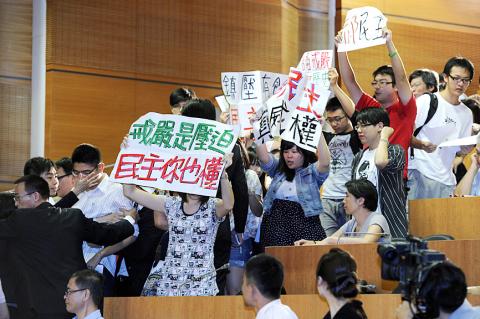|
Students call former premier out on
political past
By Shih Hsiu-chuan / Staff reporter

A group of National Taiwan
University (NTU) students protest as former premier Hau Pei-tsun addresses the
fourth “Witness Taiwan Democracy” forum organized by the Taiwan Foundation for
Democracy in Taipei yesterday.
Photo: George Tsorng, Taipei Times
Heckled during a speech delivered at
National Taiwan University yesterday, former premier Hau Pei-tsun (郝柏村) told the
audience that the interruptions staged by students amounted to “suppression of
freedom of expression.”
The government-funded Taiwan Foundation for Democracy (TFD), the host of the
event, later took steps to prevent an audience member’s video footage of the
incident from being shown in public or uploaded to the Web.
A few minutes after Hau began his speech on his experiences of Taiwan’s
democratic transition, students shouted through prepared speakers, disrupting
his speech for seven minutes.
“Shame on [Hau]” for giving the speech, the students shouted.
Hau, the most powerful man in Taiwan’s military during late president Chiang
Ching-kuo’s (蔣經國) rule in the Martial Law period, served as chief of the general
staff, defense minister and premier after the lifting of martial law.
Under Hau’s authoritarian rule, there was outright political repression and he
did nothing to promote democracy, the students said.
“He opposed direct presidential elections,” the students said, adding that “he
said Taiwan’s future is jointly decided by Chinese people and Taiwanese people,
not just by the Taiwanese.”
“He ordered military police to arrest students and crack down on student
movements on campuses,” they said.
Chang Lung-chiao (張龍僑), executive-general of the Chen Wen-chen Memorial
Foundation, was told by four people led by TFD chief executive Huang Teh-fu
(黃德福) to stop filming and asked to leave.
Chang was only able to return to the hall to film after he agreed to sign a
written pledge not to upload the video and not to display it in public,
otherwise he would have to take legal responsibility for infringing of the
rights of the host.
A student at NTU’s College of Law, surnamed Chen (陳), said he felt “indignant”
at Hau delivering a speech on democracy at NTU.
At Hau’s order, the movement led by the late professor Lin Shan-tien (林山田)
calling for abolition of Article 100 of the Criminal Code, a remnant of martial
law, at NTU was dispersed by military police, Chen said.
Another student, surnamed Chu (朱), stayed after Hau finished his speech, waiting
to ask him a question, but he was not given a chance.
“I would like to ask him if he feels regret for what he had done wrong before.
He should at least apologize for his anti-democracy statements and behavior that
committed an infringement on human rights to implement transitional justice,”
Chu said.
Legislative Speaker Wang Jin-pyng (王金平), who is also TFD president, however,
praised Hau for his “tremendous contributions” to democracy.
Hau could have exerted his influence in the military to intervene in democratic
development, like many military strongmen had done in countries in Latin
America, Africa, and Southeast Asia during their democratization process, but he
did not, said Wang, adding that Hau, instead, assisted Chiang in his plan to
push for democracy.
|
![]()
![]()
![]()